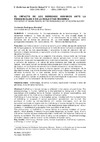Please use this identifier to cite or link to this item:
https://accedacris.ulpgc.es/jspui/handle/10553/41912
| Title: | El impacto de los derechos humanos ante la fenomenología de la esclavitud moderna | Other Titles: | The impact of human rights on the phenomenology of modern slavery | Authors: | Rodríguez Morales, Hortensia | UNESCO Clasification: | 56 Ciencias jurídicas y derecho | Keywords: | Victimología Derechos humanos Explotación humana Tráfico de personas Trata de seres humanos, et al |
Issue Date: | 2018 | Publisher: | 2340-860X | Journal: | Cadernos De Dereito Actual | Abstract: | La trata de seres humanos se constituye en reflejo de aquella esclavitud de tiempos pasados. La fenomenología de la trata de seres humanos se caracteriza por ser una de las más escandalosas y sangrantes formas de reducción del ser humano a simple mercancía, y representa una de las violaciones más graves de los derechos humanos.
La trata de seres humanos, en su acepción más amplia, incluye tanto las múltiples formas de tráfico con fines de explotación sexual (prostitución, turismo sexual, compra de novias por correspondencia y matrimonios serviles), como la extracción y comercio de órganos y el tráfico de seres humanos con fines de explotación laboral, tanto para realizar las labores más penosas que ofrecen nuestros mercados de trabajo, en condiciones de sometimiento desde una posición de servidumbre.
El fenómeno de la trata de seres humanos supone una grave vulneración de la dignidad humana, que atenta directamente contra los principios reconocidos por los derechos humanos. Es, en este sentido, donde resulta constatable la evidente relación que guarda con la histórica institución de la esclavitud. El presente trabajo, pretende realizar un análisis de la fenomenología de la esclavitud moderna y su relación con la vulneración de los derechos humanos. Trafficking in human beings is reflected in the slavery of past times. The phenomenology of human trafficking is characterized by being one of the most scandalous and bleeding forms of human reduction to simple commodities, and represents one of the most serious violations of human rights. Trafficking in human beings, in its broadest sense, includes both the multiple forms of trafficking for purposes of sexual exploitation (prostitution, sex tourism, the purchase of brides by correspondence and servile marriages), such as the extraction and trade of organs and the Trafficking of human beings for the purpose of labour exploitation, both to carry out the most painful tasks offered by our labour markets, in conditions of subjugation from a position of servitude. The phenomenon of trafficking in human beings is a serious violation of human dignity, which directly threatens the principles recognized by human rights. It is in this sense that the obvious relationship that it holds with the historical institution of slavery is verifiable. This work aims to carry out an analysis of the phenomenology of modern slavery and its relation to the violation of human rights. |
URI: | https://accedacris.ulpgc.es/handle/10553/41912 | ISSN: | 2340-860X | Source: | Cadernos Dereito Actual [ISSN 2340-860X], n. 9, p. 11-26 |
| Appears in Collections: | Artículos |
Page view(s) 5
372
checked on Nov 4, 2023
Download(s)
197
checked on Nov 4, 2023
Google ScholarTM
Check
Share
Export metadata
Items in accedaCRIS are protected by copyright, with all rights reserved, unless otherwise indicated.
